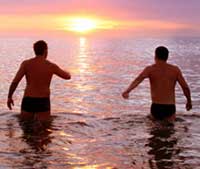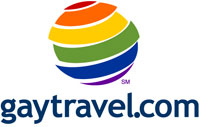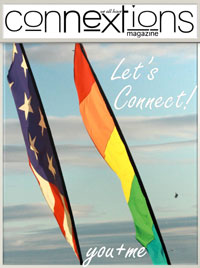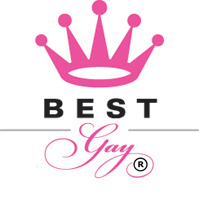Lesbian Travel and Festival at Eressos on Greece’s Lesbos island
It’s September and for a 10th year, the village of Eressos on Greece’s Lesbos island has drawn lesbians from across Europe to a unique international festival for women.
In a country strongly influenced by the Greek Orthodox church and where roughly half the population is against same-sex marriage, the lesbian-run event has been quietly growing in this corner of the Aegean Sea.
Over the past decade, attendance at the two-week International Women’s Festival has jumped from 30 to hundreds of women – mainly German, British, Dutch and Scandinavian, but also Greek and Italian.
Lesbians began to visit the island in the 70s, and have been coming back ever since. Tensions have been high at times and trouble has brewed in the past. Three Lesbians (natives of the island of Lesbos) submitted a legal challenge in an attempt to stop the Homosexual and Lesbian Community of Greece (OLKE) from using the term “lesbian”. The use of the word to denote a sexual preference derives from the island’s association with Sappho, the ancient poet who wrote about her love for women. But according to Dimitris Lambou, editor of the rightwing publication Davlos (Torch), and two female colleagues, using lesbian in this way “disgraces them around the world”; islanders, they say, are suffering “psychological and moral rape”. SERIOUSLY?! A Greek court dismissed a lawsuit!
Lesbian holiday and gay travelers are attracted by the island’s association with
Sappho, the seventh century Greek poet who wrote about her love for women and was born in Eressos.
Sappho lived from the late 7th to the early 6th century B.C. and is considered one of the greatest poets of antiquity. Many of her poems, written in the first person and intended to be accompanied by music, contain passionate references to love for other women! Just get over it already!
Dimitris Lambrou one of the litigants in the case said Sappho was not gay. “But even if we assume she was, how can 250,000 people of Lesbian descent – including women – be considered homosexual?”
“The word lesbian has been associated with gay women for the past few decades but we have been Lesbians for thousands of years,” he said.
According to an LGBT holiday and travel agency in Greece, lesbians now make up 60 per cent of visitors who come to the village, rising to 90 per cent in September when the lesbian festival takes place!
As the economic crisis continues to pinch Greece hard, Greek holidaymakers spent less this summer and many are grateful for the extended season brought by lesbian tourism.
“People in the village have got used it, especially the young people, but the old people still discuss it among themselves,” one agent says.
Gay Lesbian Travel Guide













